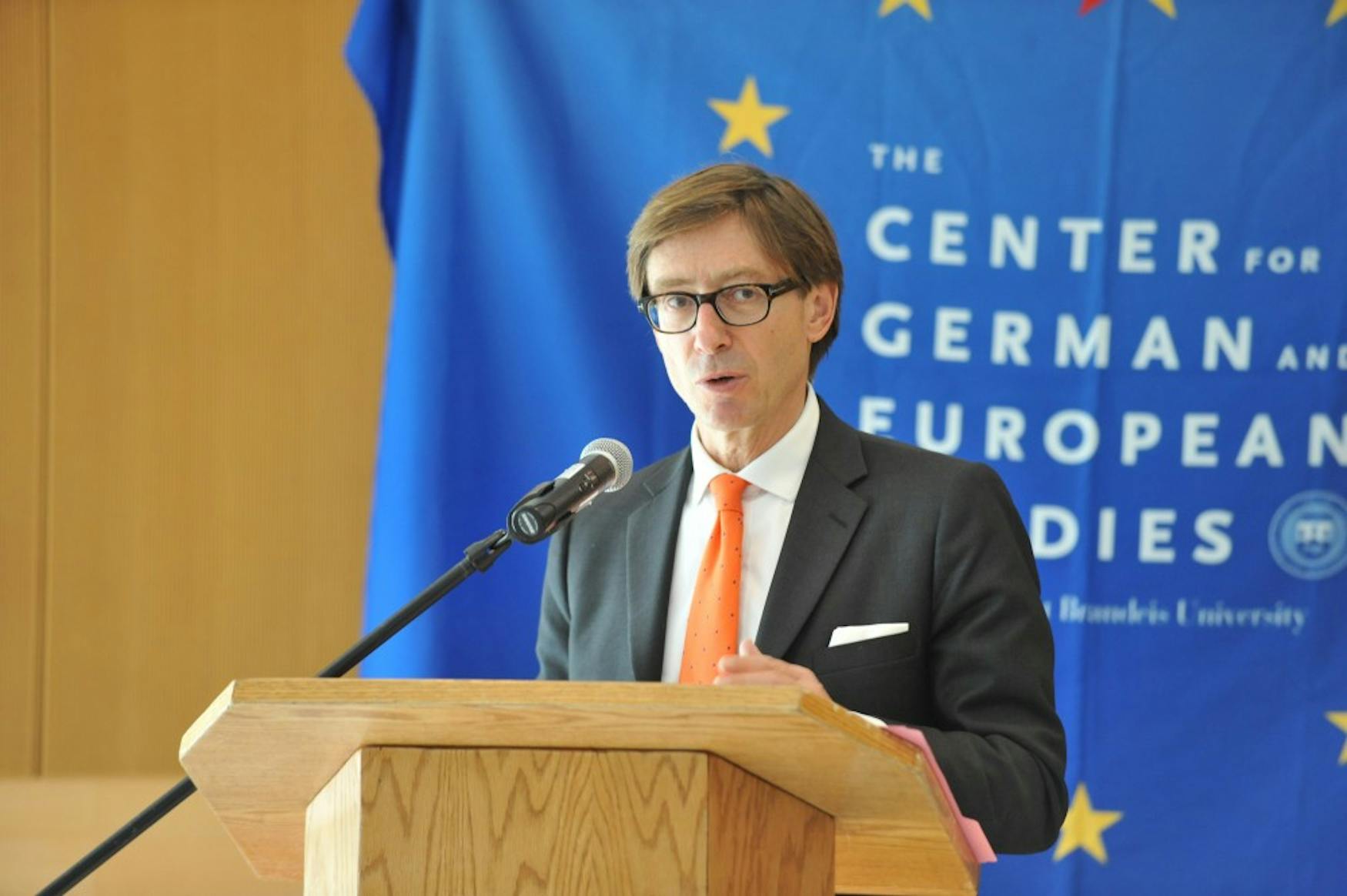German ambassador discusses his nation’s role in modern Europe
In an era when the “solidarity” of Europe has been challenged, a unified continent is all the more important, according to German Ambassador to the United States Dr. Peter Wittig in a lecture delivered in Mandel Atrium on Thursday. The lecture, titled “Germany’s Role in Europe Today,” was intended to coincide with the 25th anniversary of German unification and addressed Germany’s response to the Syrian refugee crisis, as well as Russia’s invasion of the Ukraine.
Prof. Sabine von Mering (GRALL) began by welcoming Wittig to the University. Wittig then opened his lecture by acknowledging German Reunification 25 years ago. He said that U.S. leadership was “clairvoyant when they anticipated that … this peaceful revolution unfolding in East Germany and the rest of Eastern Europe was unstoppable,” he said. “With strategic vision they embraced it and steered it in the right direction. … [It] was a moment for pure diplomatic craftsmanship. … Unified Germany got its second chance.”
Wittig then addressed Germany’s role in Europe, regarding its recent influx of refugees, who he said are mostly from Syria. “It’s hard to exaggerate the magnitude of this crisis … Germany is expecting one million [this year],” he said. “Put that in [respect] to the U.S. — that would be about four million people.” Germany, according to Witting, is “now reeling” due to a lack of an orderly, safe and legal process for addressing the rush of refugees.
Wittig also admitted that “the segment of society that is either xenophobic or hostile to immigrants needs to be taken seriously. … We have zero tolerance for those that either denounce or attack immigrants, refugees physically or verbally.” He went on to say that in order “to slow down the stream” of migrants, there needs to be a “European Solution,” which would involve preparing the border countries of Europe, including Italy, Turkey and Greece, to receive and process more people, speed up the asylum process and stop illegal trafficking. Ultimate goals for the region, according to Wittig, include “fairer distribution of refugees in Europe … help [for] refugees who would rather stay in the Middle East [though not in their native country] … [and] getting to the root causes of refugee streams.”
These root causes, he continued, are mostly concentrated on the ongoing civil war in Syria, which has caused the mass migration. Wittig added that a “political solution” involving NATO countries and, ideally, “ceasefire” are needed in the region. “Syria needs representative government,” he noted, adding that the United States, Russia, Turkey and Saudi Arabia all need to be involved in finding that solution. “There is no sustainable place for [Syrian President Bashar al-Assad] in the future. … Our hope is that with the leaders sitting together, there can at least be a political solution,” Wittig said.
Later, in a question-and-answer session, an audience member asked about how Germany would maintain security for the next 20 years with the influx of so many refugees. Wittig responded that “if [the refugees] stay, they need to be part of our culture. … It’s a huge challenge. Germany has become a country of immigrants without really realizing it. … The challenge is to have a modern European Islam that is different from the more fundamental Islam.”
Wittig then discussed the implications of Russia’s invasion of the Ukraine in 2014 and Germany’s response. He claimed that Germany had three responses to Russia’s actions: sanctions, military preparedness and continued communication and dialogue. According to a BBC News article, the sanctions involve Russia’s state banks, dual-use military equipment and some oil industry technology. In terms of military preparedness, Wittig said that “we should make clear that we are standing by.” He added that article five of NATO’s North Atlantic Treaty, which promises that an armed attack against a NATO ally — which includes the U.S., Germany and the Ukraine, among others — will be regarded as an attack against all of the allied countries, and as a group the allies will decide what action to take against the offending country. He also stated that keeping dialogue channels open with Russia is equally as important. “We don’t agree much with Russia these days,” he noted. “[But] Russia’s our neighbor. … We have to live with our neighbor. We don’t want to bring Russia down on its knees.”
In his closing statements, Wittig praised American political leadership, pointing to the United States’s recent nuclear deal with Iran as “the only peaceful way to keep Iran from a nuclear bomb,” adding that Germany “applauds” the United States. Speaking on the working relationship between the U.S. and Germany, Wittig concluded by stating that “we [Germany] need cooperation with America more than ever. … With America, we can stand a test of the times with a strong transatlantic alliance.”
The lecture was sponsored by the Center for German and European Studies.



Please note All comments are eligible for publication in The Justice.